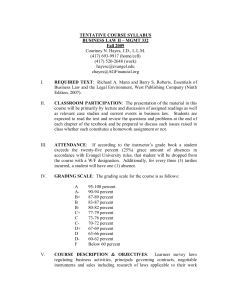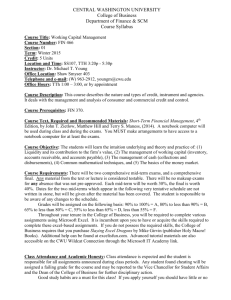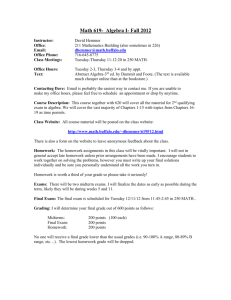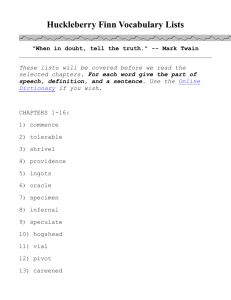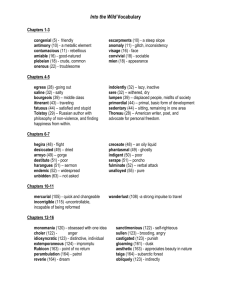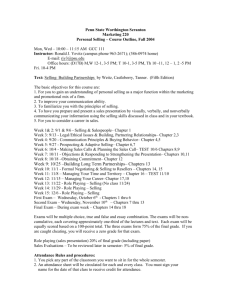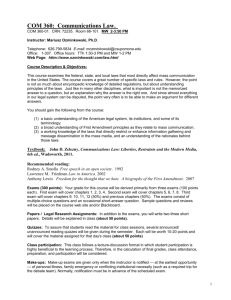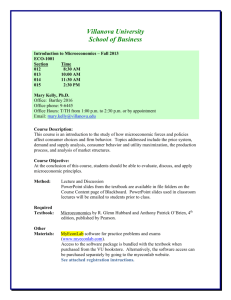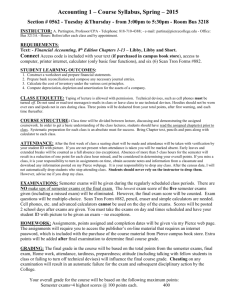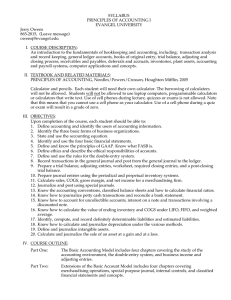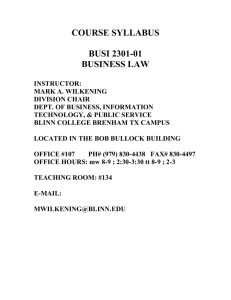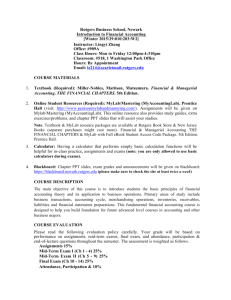TENTATIVE COURSE SYLLABUS BUSINESS LAW II
advertisement
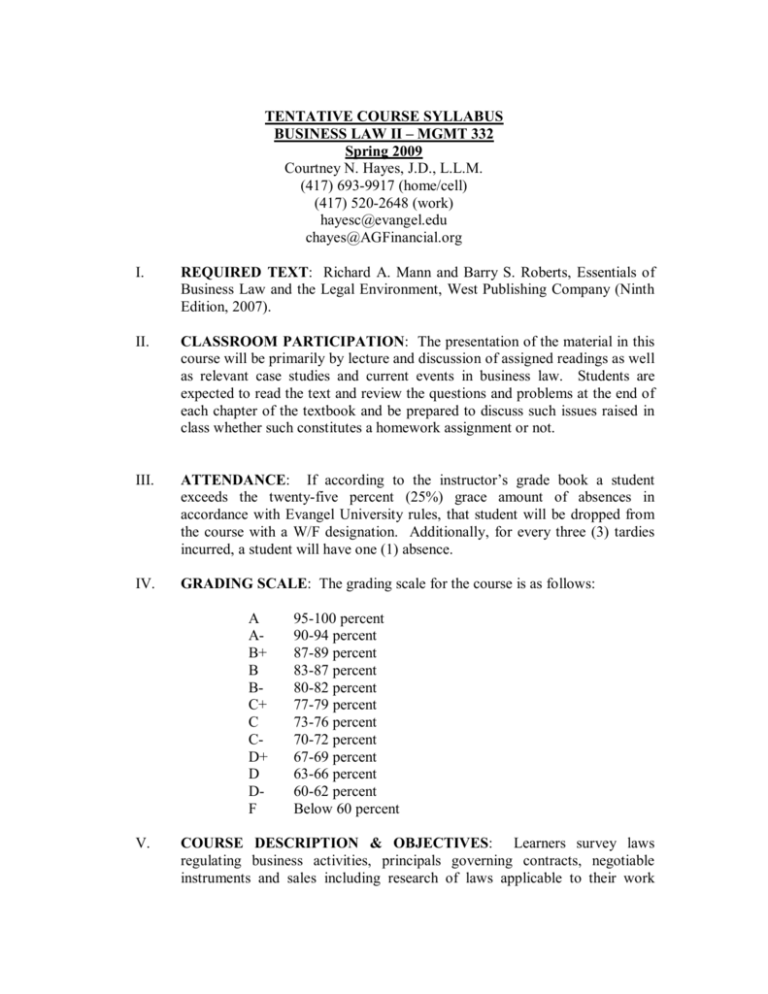
TENTATIVE COURSE SYLLABUS BUSINESS LAW II – MGMT 332 Spring 2009 Courtney N. Hayes, J.D., L.L.M. (417) 693-9917 (home/cell) (417) 520-2648 (work) hayesc@evangel.edu chayes@AGFinancial.org I. REQUIRED TEXT: Richard A. Mann and Barry S. Roberts, Essentials of Business Law and the Legal Environment, West Publishing Company (Ninth Edition, 2007). II. CLASSROOM PARTICIPATION: The presentation of the material in this course will be primarily by lecture and discussion of assigned readings as well as relevant case studies and current events in business law. Students are expected to read the text and review the questions and problems at the end of each chapter of the textbook and be prepared to discuss such issues raised in class whether such constitutes a homework assignment or not. III. ATTENDANCE: If according to the instructor’s grade book a student exceeds the twenty-five percent (25%) grace amount of absences in accordance with Evangel University rules, that student will be dropped from the course with a W/F designation. Additionally, for every three (3) tardies incurred, a student will have one (1) absence. IV. GRADING SCALE: The grading scale for the course is as follows: A AB+ B BC+ C CD+ D DF V. 95-100 percent 90-94 percent 87-89 percent 83-87 percent 80-82 percent 77-79 percent 73-76 percent 70-72 percent 67-69 percent 63-66 percent 60-62 percent Below 60 percent COURSE DESCRIPTION & OBJECTIVES: Learners survey laws regulating business activities, principals governing contracts, negotiable instruments and sales including research of laws applicable to their work environment. The following performance objectives are provided as a focus for learning in the Legal Environment of Business course. You may wish to further refine or expand upon them for personal growth or work responsibilities. If so, please discuss your personal needs with the instructor. VI. STUDY SKILLS: The study of law is somewhat different from the study of other social sciences. Not only must you know a rule of law and the source of that law, but you must also know how to apply it. Sometimes students need to know more that one rule because there may be a majority rule of law and slightly different minority rule of law. This is because much of business law is based on state law. Sometimes that law is state common law; sometimes that law is state statutory law. In either case, there are many states and the law differs from state to state. There are also general rules of law that are mentioned in the text. However, law is complex and for every general rule, there are frequently exceptions. VII. COURSE EXAMS: To prepare for law exams, you must learn both the rule (or rules) of law and the application of those rules. You should take an orderly, systematic approach to both your studying for and taking of the exam. In taking law exams, issue identification is essential. The best way to recognize issues is by reading the text, including the cases, and then working through the case problems at the end of each chapter. Course Exams can be made up of any or all of the following: True/False; Multiple Choice; Essay and Case Analysis. VIII. FINAL EXAM: The Final Exam in this course will be comprehensive. You will not have to take the Final Exam if you meet the following criteria prior to the date of the Final Exam: (1) Grade of 95% or higher, (2) Attendance – have missed no more that 4 class sessions throughout the semester, and (3) Class Participation (at Professor’s discretion). IX. EXTRA CREDIT: Extra Credit is not planned for this course. However, if extra credit assignment should be offered in this course, it will be offered to the entire class and not to any one particular student. X. GRACE POINTS: Grace points are additional points (up to 1% of the total points possible in the class) available to each student based on the following requirements: (1) Class Participation (at professor’s discretion); (2) Assignments turned in on time – no more than one late assignment; and (3) Attendance – no more than 4 absences during the semester. . XI. SCHEDULE: Date Assignment_______________________________ 01/08/09 Introduction to Class 01/13/09 Chapter 29 01/15/09 Chapter 30 01/20/09 Review for Agency Exam 01/22/09 Agency Exam (Chapters 29-30) 01/27/09 Chapter 31 01/29/09 Chapter 32 02/03/09 Chapters 33 02/05/09 Business Entities – class project 02/10/09 Chapters 34 02/12/09 Chapter 35 02/17/09 Chapter 36 02/19/09 Chapter 37 Business Entity Project Due 02/24/09 Review for Mid-Term (Study Guide to be Provided) 02/26/09 MID-TERM EXAM (Chapters 31-37) 03/03/09 NO CLASS – Spring Break 03/05/09 NO CLASS – Spring Break 03/10/09 Internet Scavenger Hunt 03/12/09 Chapters 38-39 03/17/09 Review for Quiz 03/19/09 Debtor Creditor Relations Quiz (Chapters 38-39) Intro to Trusts and Wills – Chapter 52 03/24/09 Chapter 52 / Assignment “Write your own Will” 03/26/09 Will Assignment due / Chapter 42 03/31/09 Chapter 41 / Trademark Assignment 04/02/09 Trademark Assignment Due / Review for Exam 04/07/09 Exam (Chapters 41, 42 and 52) 04/09/09 Trial Practice Rules – Trial Project Assigned 04/14/09 Trip to Courthouse / Prepare for trials 04/16/09 In class trial preparation 04/21/09 Trial #1 / Trial #2 04/23/09 Trial #2 / REVIEW FOR FINAL EXAM TBA FINAL EXAM (Comprehensive) 10am-12pm ** THIS SYLABUS IS SUBJECT TO CHANGE **
